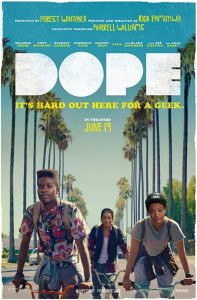
Dope is a semi-autobiographical film written and directed by Rick Famuyiwa. He describes the film as a “what if” story based on an interaction Famuyiwa had while he was growing up. Famuyiwa is represented by Malcolm, played by Shameik Moore, who is a nerdy high schooler growing up in the rough neighborhood of Inglewood, California, outside of Los Angeles. He and his two friends, Jib (played by Tony Revolori) and Diggy (played by Kiersey Clemons), spend their days riding bikes, listening to 90s hip-hop and playing music together. Malcolm dreams of moving out of Inglewood and attending Harvard, but he faces constant discouragement from his peers and teachers. However, everything changes when Malcolm has a run-in with a drug dealer named Dom, played by rapper A$AP Rocky. After helping Dom flirt with a girl he (and Malcolm) likes, Dom invites Malcolm to his birthday party, which also happens to be a front for a major drug deal. The party is attacked, and Dom stashes thousands of dollars worth of ecstasy and a loaded pistol in Malcolm’s backpack, which he discovers while he’s at school. Chaos and hilarity ensue, as Malcolm and his friends adventure around Los Angeles, attempting to either return or sell the drugs they are now in possession of, making friends and enemies along the way.
Dope is a unique entry in the category of movies about the drug trade. On the surface, the story the film tells is nothing revolutionary. A young teen from a poor neighborhood has his bright future jeopardized by the drug trade. However, Dope takes a number of steps to distinguish itself from this trope, making the film fresh and worthy of study. First, Dope is primarily a comedy, and tackles many of the usually dark issues presented in the film with a sense of humor and levity. However, this can lead to controversy, as some may argue that making light of drug dealing and usage is inappropriate. One scene in particular plays someone nearing an overdose on ecstasy for laughs. Through my research, I hope to examine how comedy can help us deal with difficult topics and situations, and where the line is between making light and glorifying.
Second, unlike much of the media that has been produced surrounding drug dealing recently, Dope brings a uniquely twenty-first century angle to the subject. Malcolm and his friends utilize the internet and cryptocurrencies to sell their product, and social media plays an important role in publicizing their business. I want to take a look at how this present day setting affects how the topic of drug dealing is depicted, in comparison to media that is set in the past.
Third, music plays a vital role in Dope, both in the movie itself and behind the scenes. Malcolm’s life is intertwined with music. He and his friends are in a punk band called Awreeoh (pronounced oreo) and frequently discuss topics relating to hip-hop. Music even drives the plot, as Malcolm and Dom’s first interaction revolves around what really counts as 90s hip-hop. The connections between music and Dope are even more prominent outside the movie itself. Dom, a prominent character throughout the film, is played by artist A$AP Rocky, and the film features cameos from other artists like Vince Staples, Tyga and Casey Veggies. Additionally, the film utilized creative direction from executive producers Pharrell Williams and Sean “Diddy” Combs. Williams especially played an important part in crafting the aesthetic of Dope. Music and the drug trade have been intertwined in the past half-century, and Dope presents a prime example of this connection. Overall, I believe that Dope will provide a unique and fresh take on the topics being examined in this project. I hope you find my analysis as fascinating and rewarding as I did putting it together.
ABOUT THE AUTHOR:
Ethan Weihl is a rising Senior at Northwestern University, where he is majoring in Journalism and History, with a concentration in European History. He is also a member of the A&R team of Niteskool Records, a student-run record label. He likes to spend his free time biking, hammocking and listening to music.
CREDITS:
Directed by: Rick Famuyiwa
Produced by: Nina Yang Bongiovi and Forest Whitaker
Created in: USA
Year released: 2015